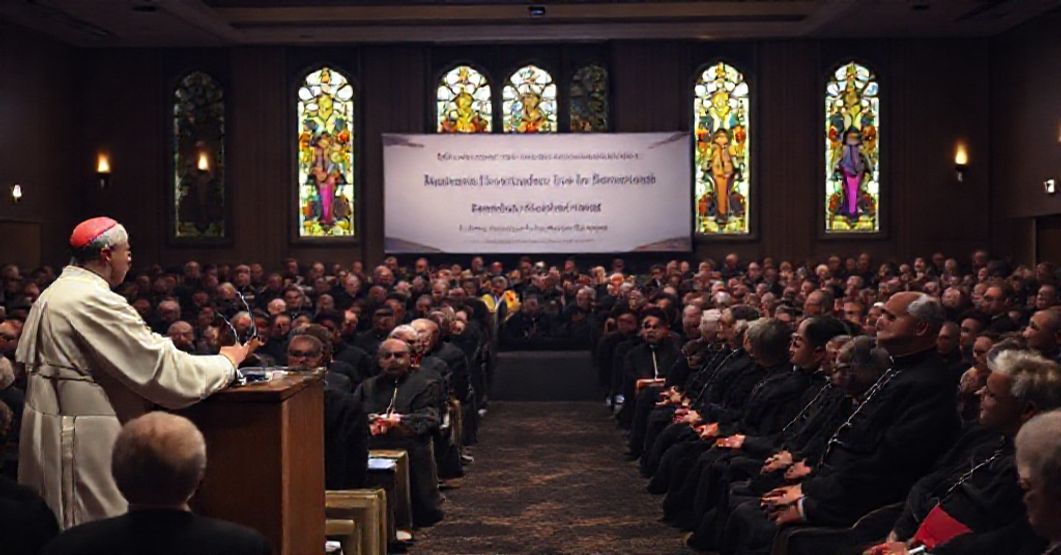Vatican Conference Promotes Mystical Subjectivism Over Catholic Doctrine
Vatican Conference Promotes Mystical Subjectivism Over Catholic Doctrine
Vatican News portal reports (11 November 2025) on a conference titled “Mysticism, Mystical Phenomena, and Holiness” organized by the “Dicastery for the Causes of Saints” at the Pontifical Urban University. The event featured “Cardinal” Víctor Manuel Fernández and other speakers advocating for the normalization of private revelations while minimizing the Church’s doctrinal authority. The report celebrates “the free action of the Spirit” manifested in “mysticism open to all,” framing these experiences as a “therapeutic path” for modern humanity’s alleged “loss of sensitivity toward God.”
Subversion of Discernment Standards
“Cardinal” Fernández explicitly undermined the Church’s historic role in safeguarding revelation, stating:
“The Holy Spirit works in the Church with full freedom… even through supernatural events such as apparitions or visions.”
This relativistic framing contradicts Dei Filius (Vatican I), which declares: “If anyone says that divine revelation cannot be made credible by external signs… let him be anathema” (Canon 3.3). The admission that only 3-4 supernatural recognitions occurred since Vatican II—despite 3,500 beatifications—exposes systematic doctrinal bankruptcy. Fernández further negates infallibility by claiming Church approvals are merely
“prudential conclusions”
that
“do not guarantee absolute certainty.”
Such statements violate Pope Benedict XIV’s De Servorum Dei Beatificatione, which mandates rigorous examination of miracles as “signs from heaven” (Book IV, Part 1, Ch. 8).
Naturalization of Supernatural Graces
Professor André Vauchez’s lecture epitomized modernist historicism by reducing medieval mysticism to sociological phenomena—a
“refuge for women who… had to dictate their experiences to clerics.”
This naturalistic interpretation denies the gratia elevans (elevating grace) essential to sanctity. Worse, Vauchez praised 14th-century “Popes” for exploiting mystics like St. Catherine of Siena during crises, perverting their witness into political tools. True Catholic theology holds that mystics serve ad majorem Dei gloriam (for God’s greater glory), not as crisis managers for corrupt hierarchies.
Gnostic “Tasting” Versus Dogmatic Fidelity
“Fr.” Luca Bolis’ metaphor distinguishing theological knowledge as
“eating”
and mysticism as
“tasting”
inverts the hierarchical relationship between faith and experience condemned in Pius X’s Pascendi Dominici Gregis: “The religious sense… penetrates… the phenomena… until it attains to the absolute and eternal principle” (§14). By labeling mysticism a
“therapeutic path,”
Bolis reduces divine communication to psychological self-help—a direct embrace of Feuerbach’s projection theory denounced in Pius IX’s Syllabus of Errors (Proposition 22).
Strategic Omissions Reveal Apostasy
The conference’s glaring silence on the Three Ages of the Interior Life (R. Garrigou-Lagrange) and the Dark Night of the Soul (St. John of the Cross) exposes its anti-doctrinal agenda. No speaker referenced the normative criteria for authentic mysticism: humility, obedience to lawful authority, and alignment with defined dogma (St. Teresa of Avila, Interior Castle V.3). Instead, Fernández emphasized avoiding
“cases exploited for profit or control,”
tacitly admitting the conciliar sect’s inability to prevent financial and sexual scandals proliferating under its watch.
Conclusion: Pantheon of Subjectivism
This conference exemplifies the conciliar sect’s final transition from Christianity to gnostic therapy. By elevating private revelations to parity with public revelation (contrary to Dei Verbum §4 pre-1958 understanding) and framing mysticism as medicine for secular malaise, the Vatican apparatus completes its surrender to the cult of man prophesied in Pius XI’s Quas Primas: “When once men recognize… that Christ has been cast out of public life… human society will be at last shaken by a vast upheaval” (§18). The true therapeutic path remains unchanged: Revertere ad me, et ego revertar ad vos (Zechariah 1:3)—”Return to Me, and I will return to you.”
Source:
Cardinal Fernández at mysticism conference: ‘Spirit moves in varied ways’ (vaticannews.va)
Date: 11.11.2025
